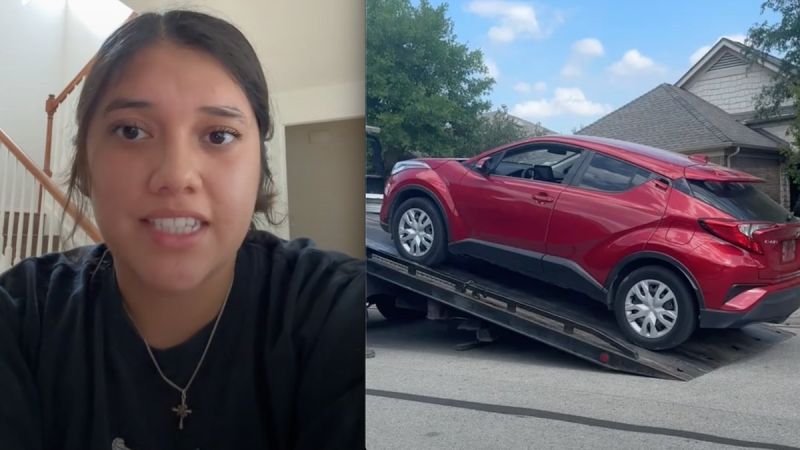"Is it really worth totaling out a car for hail damage, especially if it's almost paid off? Shouldn't you live with the hail dents?"
That's the question that was asked of Shayla (@carrrrr173), who had her 2021 Toyota C-HR totaled by the insurance company. Should she have kept the SUV? Shayla only had two car payments left before it was paid off, and the small SUV only had 29,000 miles.
She took the payout and let the insurance company tow her car away. Now, she's being questioned about her decision to let the insurance total her car and take the money.
Shayla says in her TikTok clip, "I was going to keep my car because it was only $600 to fix the broken windshield. Then I was waiting to see what the insurance company would offer."
Imagine having a car that you bought new; you have two payments left before it's paid off, and a hail storm damages your car. You have a 2021 Toyota C-HR with only 29,000 miles.
The insurance company offers you $10,000, half the fair market value for your car. It sounds like a good offer, so you take it. But was it a good decision?
Shayla says, "The payout for my car was not enough to buy a new one. My car only had 29,000 miles. I bought it new in high school in 2021 and paid $28,000 in the first place, so it wasn't that expensive."
"So, I decided to take the payout from the insurance company. I had to think really hard about keeping it. It was a hard decision because I loved my car. It wasn't easy, and I'm questioning my decision."
"I can't buy it back; it's too late, she's gone. The buyback was over $10,000."
Did Shayla make the right decision?
A report from Car and Driver says, "Each insurance provider has a formula for determining whether or not to total your car. This formula may vary from provider to provider, but not by much. Insurance companies use three main factors to decide when to total a vehicle."
They are:
- If the damage is severe and the vehicle can't be safely repaired, it's considered totaled.
- They will total it if it will cost more to repair your vehicle than it's worth.
- State regulations may dictate the amount of damage your vehicle can have before it's totaled.
How Much Is Your Totaled Car Worth?
Car and Driver says to get an idea of what your totaled car is worth, first find the Kelley Blue Book value for it in fair condition.
- Figure out what the 20 to 40 percent fair condition value is.
- Depending on the amount of damage done to your vehicle, it's likely going to be closer to the 20 percent range, according to CarBrain.
- This gives you an idea of what your totaled vehicle is worth.
Shayla's 2021 Toyota C-HR's fair market value is $20,000 in fair condition. She has the top trim C-HR Limited Sport. Because it has such low miles, it's worth this much if she were to trade it in (without the hail damage).
However, the insurance company is offering her half that amount. According to Car and Driver, that's a very fair offer, considering most insurance providers offer up to 40% of the value.
When should you accept the insurance company's payout for a totaled car?
You should typically accept the insurance company's payout for a totaled car once you've reviewed the settlement offer and clearly understand the value of the vehicle and your financial obligations. It's generally best to accept the payout to avoid potential issues with salvaging the vehicle and to move forward with replacing it.
Here's a more detailed breakdown:
1. Review the Settlement Offer:
- Actual Cash Value (ACV): The insurance company will determine the ACV of your car based on its condition immediately before the accident.
- Deductible: Remember that your deductible will reduce the payout.
- Negotiation: You can negotiate with the insurance company if you believe the ACV is too low. Research the car's value independently using sources like Kelley Blue Book to support your case.
2. Financial Obligations:
- Car Loan/Lease: If you have a loan or lease on the car, the insurance company will likely pay the lien holder (the bank or leasing company) first.
- GAP Insurance: GAP insurance will cover the difference if you owe more on the car than it's worth (a "gap").
3. Process:
- Title Transfer: Once you accept the settlement, you'll need to transfer the title to the insurance company.
- Payout: You'll receive a check for the payout amount after the title is transferred.
- Timeframe: Insurance companies typically have about 30 days to investigate a claim, according to Progressive. The payout can be expected within a few days to a few weeks after the ACV is determined.
Conclusion
In Shayla's situation, she only had two car payments left before it was paid off. If she had a $300 car payment, she only owed $600. With her deductible, which, let's say, was $500, she would have received a check from the insurance company for $8,900.
That would make a good down payment on a new 2025 Toyota Corolla Cross XLE trim with an MSRP of $30,000. She would have a loan of $21,000 and a car payment of $377 for a 60-month loan.
That's about what Shayla was paying monthly for the 2021 Toyota C-HR. So, she takes the insurance company's payout.
Was It The Best Decision?
If Shayla had kept her 2021 Toyota C-HR and taken the insurance money ($10,000 minus the deductible and the last two payments), she would have had $8,300 in the bank after she had paid for a new windshield.
She would be driving a paid-off car with only 29,000 miles on it, which would last her another five years or longer. It wouldn't look great with the hail damage, but she could have saved the $377 a month for her car payment and had 22,620 in five years.
It's important to note that her 2021 Toyota C-HR would have a salvage title, which would affect the value when she sold the car.
What Would You Have Done?
Have you had a car totaled by your insurance company? What did you do? If so, click the red Add New Comment link below and let us know.
Check out my Toyota 4Runner story: Every Time I Take My Toyota 4Runner To The Dealer For An Oil Change, They Tell Me I Need A New Cabin Air Filter, They Aren’t Getting Me Again
I am Denis Flierl, a Senior Torque News Reporter since 2012. My 30+ year tenure in the automotive industry, initially in a consulting role with every major car brand and later as a freelance journalist test-driving new vehicles, has equipped me with a wealth of knowledge. I specialize in reporting the latest automotive news and providing expert analysis on Subaru, which you'll find here, ensuring that you, as a reader, are always well-informed and up-to-date. Follow me on my X SubaruReport, All Subaru, WRXSTI, @DenisFlierl, Facebook, and Instagram.
Photo credit: Denis Flierl via Shayla
Set Torque News as Preferred Source on Google











Comments
Hail damage is simple and…
Permalink
Hail damage is simple and relatively inexpensive to repair. Why on earth would you take a total loss payout for simple hail damage? That's crazy!
Take it, car is gonna need a…
Permalink
Take it, car is gonna need a trans anyway. They all do at some point.